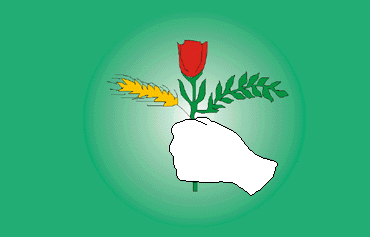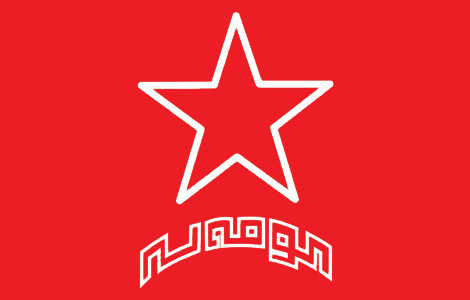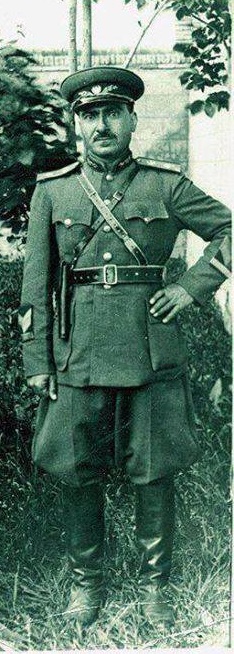|
Ali Askari
Ali Askari (1936–1978) was a Kurdish politician. He was a prominent leader in Iraqi Kurdistan and his political party was the Patriotic Union of Kurdistan (PUK). Early life and childhood He was born in 1936 in the village of Goptapa in Kurdistan. The family is originally from the village of Sargalo, but Ali Askari's great-grandfather moved to Askar in order to settle down in this village. In early 1916 Ali Askari's father, Abdullah Askari, went on to build a village close to Askar which today is called Goptapa. His father was the head of the Qala Saywka tribe, one of the most famous and largest tribes in Iraqi Kurdistan. Ali Askari was the youngest among seven brothers and three sisters. Since there was nowhere to get an education in Goptapa, he had to move to Askar in order to start his studies, at the age of seven. He studied in Askar until he was in the third grade, then moved to the village of Aghjalar to continue his studies in the fourth and fifth grade for his last ye ... [...More Info...] [...Related Items...] OR: [Wikipedia] [Google] [Baidu] |
Iraqi Kurdistan
Iraqi Kurdistan or Southern Kurdistan ( ku, باشووری کوردستان, Başûrê Kurdistanê) refers to the Kurdish-populated part of northern Iraq. It is considered one of the four parts of "Kurdistan" in Western Asia, which also includes parts of southeastern Turkey (Northern Kurdistan), northern Syria (Western Kurdistan), and northwestern Iran (Eastern Kurdistan). Much of the geographical and cultural region of Iraqi Kurdistan is part of the Kurdistan Region (KRI), an autonomous region recognized by the Constitution of Iraq. As with the rest of Kurdistan, and unlike most of the rest of Iraq, the region is inland and mountainous. Etymology The exact origins of the name ''Kurd'' are unclear. The suffix ''-stan'' is an Iranian term for region. The literal translation for Kurdistan is "Region of Kurds". The name was also formerly spelled ''Curdistan''. One of the ancient names of Kurdistan is ''Corduene''.A.D. Lee, ''The Role of Hostages in Roman Diplomacy with Sas ... [...More Info...] [...Related Items...] OR: [Wikipedia] [Google] [Baidu] |
Zaxo
Zakho, also spelled Zaxo ( ku, زاخۆ, Zaxo, syr, ܙܵܟ݂ܘܿ, Zākhō, , ) is a city in the Kurdistan Region of Iraq, at the centre of the eponymous Zakho District of the Dohuk Governorate, located a few kilometers from the Iraq–Turkey border. The population of the town rose from about 30,000 in 1950 to 350,000 to 1992 due to Kurds fleeing other areas of the country. The original settlement may have been on a small island in the Little Khabur river, which flows through the modern city. The Khabur flows west from Zakho to form the border between Iraq and Turkey, continuing into the Tigris. The most important rivers in the area are the Zeriza, Seerkotik and the aforementioned Little Khabur. History Gertrude Bell, the renowned British archaeologist and Arabist who advised British governors in the region in the closing years of the British Mandate, was convinced that Zakho was the same place as the ancient town of Hasaniyeh. She also reported that one of the first Christian ... [...More Info...] [...Related Items...] OR: [Wikipedia] [Google] [Baidu] |
Nawshirwan Mustafa
Nawshirwan Mustafa (22 December 1944 – 19 May 2017) ( ku, نەوشیروان مستەفا) was an Iraqi Kurdish politician who served as the General Coordinator of the Movement for Change and the leader of the opposition in the Kurdistan Region from 1 April 2009 to his death on 19 May 2017. Early life Nawshirwan Mustafa was born on 22 December 1944 in the old quarter of Sulaymaniyah, Iraq, the son of Mustafa Émin Khider. Sulaymaniyah has been home to the Mustafa Émin Khider family since the city was established in 1784. Unlike Kurdistan's other prominent political leaders Masoud Barzani and Jalal Talabani, Mustafa hails from a city, not a village, and is not a member of a tribe, Nawshirwan built his reputation on being a republican who opposed family rule and hereditary political parties. Mustafa attended the Royal King Faisal school in Sulaymaniyah and was also taught foreign languages by private tutors at an early age. He went on to study political science at Baghdad Un ... [...More Info...] [...Related Items...] OR: [Wikipedia] [Google] [Baidu] |
Komala Party Of Iranian Kurdistan
The Komala Party of Iranian Kurdistan ( ku, , Komełey Şorrişgêrrî Zehmetkêşanî Kurdistanî Êran, lit=Society of Revolutionary Toilers of Iranian Kurdistan), commonly shortened to Komalah ( ku, Komełe; fa, کومله), is a social-democratic ethnic party of Kurds in Iran. Formerly with Marxist-Leninist and communist ties, the Komalah is a well established party with a history of more than five decades. The Komala party's headquarters are presently in the Kurdistan Region of Iraq. They have an armed wing that has a history of leading the Kurdish resistance. The Komalah advocates for anti-imperialism and Kurdish self-determination. The group is classified as a terrorist organization by Iran and Japan. Since 2018, it is a registered lobby in the United States. Komala has been engaged in guerrilla warfare against the Iranian government, notably during the 1979 Kurdish rebellion and the Iran–Iraq War. It was also involved in armed conflict against the Democratic ... [...More Info...] [...Related Items...] OR: [Wikipedia] [Google] [Baidu] |
Mustafa Barzani
Mustafa Barzani ( ku, مەلا مستهفا بارزانی, Mistefa Barzanî; 14 March 1903 – 1 March 1979) also known as Mela Mustafa (Preacher Mustafa), was a Kurdish leader, general and one of the most prominent political figures in modern Kurdish politics. In 1946, he was chosen as the leader of the Kurdistan Democratic Party (KDP) to lead the Kurdish revolution against Iraq. Barzani was the primary political and military leader of the Kurdish revolution until his death in March 1979. He led campaigns of armed insurgency against both the Iraqi and Iranian governments.Korn, David (1994-06)''"The Last Years of Mustafa Barzani."'' Retrieved 2006-11-15. Early life Mustafa Barzani was born in 1903 in |
Saddam Hussein
Saddam Hussein ( ; ar, صدام حسين, Ṣaddām Ḥusayn; 28 April 1937 – 30 December 2006) was an Iraqi politician who served as the fifth president of Iraq from 16 July 1979 until 9 April 2003. A leading member of the revolutionary Arab Socialist Ba'ath Party, and later, the Baghdad-based Ba'ath Party and its regional organization, the Iraqi Ba'ath Party—which espoused Ba'athism, a mix of Arab nationalism and Arab socialism—Saddam played a key role in the 1968 coup (later referred to as the 17 July Revolution) that brought the party to power in Iraq. As vice president under the ailing General Ahmed Hassan al-Bakr, and at a time when many groups were considered capable of overthrowing the government, Saddam created security forces through which he tightly controlled conflicts between the government and the armed forces. In the early 1970s, Saddam nationalised the Iraq Petroleum Company and independent banks, eventually leaving the banking system insolve ... [...More Info...] [...Related Items...] OR: [Wikipedia] [Google] [Baidu] |
Mohammad Reza Pahlavi
Mohammad Reza Pahlavi ( fa, محمدرضا پهلوی, ; 26 October 1919 – 27 July 1980), also known as Mohammad Reza Shah (), was the last ''Shah'' (King) of the Imperial State of Iran from 16 September 1941 until his overthrow in the Iranian Revolution on 11 February 1979. Owing to his status, he was usually known as the Shah. Mohammad Reza Shah took the title ''Shahanshah'' ("King of Kings") on 26 October 1967 and held several other titles, including that of ''Aryamehr'' ("Light of the Aryans") and ''Commander-in-Chief of the Iranian Armed Forces, Bozorg Arteshtaran'' ("Commander-in-Chief"). He was the second and last monarch of the Pahlavi dynasty, House of Pahlavi. His dream of what he referred to as a "Great Civilization" ( fa, links=no, تمدن بزرگ, tamadon-e bozorg) in Iran led to a rapid industrial and military modernization, as well as economic and social reforms. Mohammad Reza came to power during World War II after the Anglo-Soviet invasion of Iran, Anglo-S ... [...More Info...] [...Related Items...] OR: [Wikipedia] [Google] [Baidu] |
Iran
Iran, officially the Islamic Republic of Iran, and also called Persia, is a country located in Western Asia. It is bordered by Iraq and Turkey to the west, by Azerbaijan and Armenia to the northwest, by the Caspian Sea and Turkmenistan to the north, by Afghanistan and Pakistan to the east, and by the Gulf of Oman and the Persian Gulf to the south. It covers an area of , making it the 17th-largest country. Iran has a population of 86 million, making it the 17th-most populous country in the world, and the second-largest in the Middle East. Its largest cities, in descending order, are the capital Tehran, Mashhad, Isfahan, Karaj, Shiraz, and Tabriz. The country is home to one of the world's oldest civilizations, beginning with the formation of the Elamite kingdoms in the fourth millennium BC. It was first unified by the Medes, an ancient Iranian people, in the seventh century BC, and reached its territorial height in the sixth century BC, when Cyrus the Gr ... [...More Info...] [...Related Items...] OR: [Wikipedia] [Google] [Baidu] |
1975 Algiers Agreement
The 1975 Algiers Agreement (commonly known as the Algiers Accord, sometimes as the Algiers Declaration) was an treaty, agreement between Empire of Iran, Iran and Ba'athist Iraq, Iraq to settle any disputes and conflicts concerning their Iran–Iraq border, common border (such as the Shatt al-Arab, known as Arvand Rud in Iran), and it served as basis for the bilateral treaty, treaties signed on 13 June and 26 December 1975. The agreement was intended to end disagreement between Iraq and Iran on their borders on the Shatt al-Arab waterway and in Khuzestan Province, Khuzestan, but Iraq also wished to end the Second Iraqi–Kurdish War, Kurdish rebellion. Less than six years after signing the treaty, on 17 September 1980, Iraq abrogated the treaty following a series of border clashes between the two countries and launched a Iraqi invasion of Iran, full-scale invasion of Iran on 22 September 1980. Friction continues on the border despite the treaty being binding under international la ... [...More Info...] [...Related Items...] OR: [Wikipedia] [Google] [Baidu] |
Omar Mustafa
Omar Mustafa (born 23 March 1985) is a Swedish politician of Syrian descent and leader of the Islamic organisation in Sweden. He was a politician for the Social Democrat Party for AStockholm between 7 and 13 May 2014. In 2007 he was chairman of Sveriges Unga Muslimer (English: "Muslim Youth of Sweden") and was also in the committee of Forum for European Muslim Youth and Student Organisations (FEMYSO), a subsidiary of the Federation of Islamic Organizations in Europe (FIOE). In a 2007 interview with Young Left, he criticized Denmark for its restrictive policies on Islam and its active participation in the War on Terror. He as become known in media for inviting homophobic and antisemitic people to make lectures as his role as leader for the Islamic organisation. Mustafa is a developments CEO for the study company Ibn Rushd. He has previously been active within Sweden's Young Muslims and in 2010 he became the organisations general secretary. Mustafa was also in 2007 a board mem ... [...More Info...] [...Related Items...] OR: [Wikipedia] [Google] [Baidu] |
Jalal Talabani
Jalal Talabani ( ku, مام جەلال تاڵەبانی, translit=Celal Talebanî; ar, جلال طالباني ; 1933 – 3 October 2017) was an Iraqi Kurdish politician who served as the sixth president of Iraq from 2006 to 2014, as well as the president of the Governing Council of Iraq. He was the first non-Arab president of Iraq. He is known as Mam Jalal (uncle Jalal in Kurdish) amongst the Kurds. Talabani was the founder and secretary-general of one of the main Kurdish political parties, the Patriotic Union of Kurdistan (PUK). He was a prominent member of the Interim Iraq Governing Council, which was established following the overthrow of Saddam Hussein in the 2003 invasion of Iraq. Talabani was an advocate for Kurdish rights and democracy in Iraq for more than 50 years. Early life and education Talabani was born in Kelkan village into the Koysinjaq branch of the Talabani family. The Talabani lineage has produced many leading social figures including the poet Riza Ta ... [...More Info...] [...Related Items...] OR: [Wikipedia] [Google] [Baidu] |
Ibrahim Ahmad
Ibrahim Ahmad (6 March 1914 – 8 April 2000) (alternatively spelt Ibrahim Ahmed or Ibrahîm Ehmed) ( kmr, Ibrahîm Ehmed, ckb, ئیبراهیم ئهحمهد) was a Kurdish writer, novelist, judge and translator who founded the Patriotic Union of Kurdistan in 1975. He is the father-in-law of Jalal Talabani and Abdul Latif Rashid through both of his daughters. Biography Ahmad was born in Sulaimaniya in the Ottoman Empire and studied Law at the University of Baghdad, graduating in 1937. From 1942 to 1944, he served as a judge in the cities of Irbil and Halabja. In 1939, he, along with Alaaddin Sajadi, founded the Kurdish literary periodical ''Gelawêj''. He acted as the publisher and the Editor in Chief of that journal. ''Gelawêj'' was published until 1949. It was during this period that he became involved in politics. In 1944 he became the head of the local branch of Komeley Jiyanewey Kurd (J.K.) in Sulaymaniyah. Subsequently, this branch evolved to serve the entire ... [...More Info...] [...Related Items...] OR: [Wikipedia] [Google] [Baidu] |

.jpg)



.png)